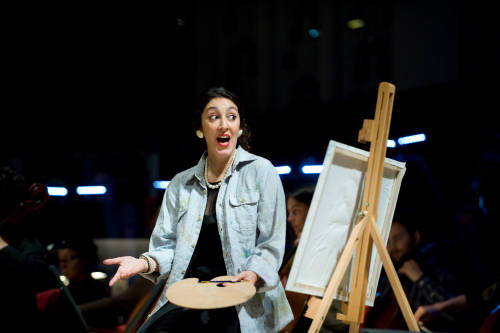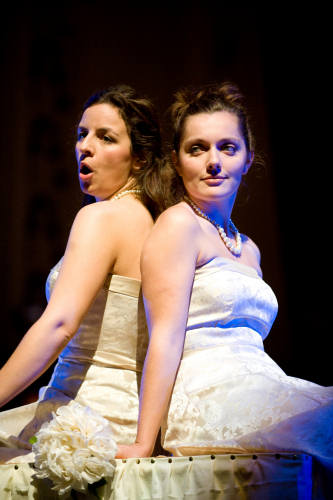Other Links
Editorial Board
- Editor - Bill Kenny
Founder - Len Mullenger
Google Site Search
SEEN
AND HEARD OPERA REVIEW
Liverpool, European Capital of Culture 2008 Programme - Wolf-Ferrari and Offenbach Operas: European Opera Centre and Liverpool Philharmonic Orchestra conducted by Vasily Petrenko, Liverpool Philharmonic Hall. 22.11.2008 (RJF)
Semi staged presentations of:
Wolf-Ferrari: Il segreto di Susanna (1909)
Offenbach:
Un mari à la
porte (1859)
Offenbach’s Un mari
If the City of Liverpool was an unexpected choice as European
Capital of Culture 2008 it has certainly done the title proud
over this past year. Inevitably of course there has been critical
and destructive media comment about the cost involved, as there
always is for arts venture and
for anything with the title of European in
it. But with a first class orchestra already in situ, and the
arrival of the European Opera Centre at
Liverpool Hope University, the classical
musical side of the year had promise from the start. Despite the
media coverage of an event involving a former member of the Beatles,
it was members of the European Opera Centre who initiated the
Liverpool European Capital of Culture 2008 last New Year’s
Eve (see
review) with a performance of Donizetti’s opera Emilia Di
Liverpool. This was presented, in the round, in the wonderful
ambience of the refurbished Small Concert Hall of St. Georges Hall,
the whole Hall having undergone a £23 million refurbishment
before its formal
opening by the Prince of Wales in
early 2007. With a small stage orchestra and double and even triple
casting, the opera was presented
over the following week. For their latest
event, the European Opera Centre joined up with the Liverpool
Philharmonic Orchestra to present two one act operas with the linked
theme of secrets and husbands.
Liverpool’s Philharmonic Hall predates the Birmingham’s Symphony
Hall and Manchester’s Bridgewater by a decade or three and its
internal décor seems somewhat dated in comparison. However, its full
orchestral stage was sufficient for semi-staged performances with an
acting area accommodating real and representational sets as well as
the full Liverpool Philharmonic Orchestra
directed by its Principal Conductor Vasily Petrenko.
The European Opera Centre began life eleven years ago with the
support of the European Parliament and Commission. Its principal aim
is to help young European singers
gain experience in order to
help them find
employment in opera after their training in a conservatoire. Prior
to its creation the only such opportunities for young singers in
Europe were mainly in eight of the German opera houses. It has to be
noted that the concept and importance of the young artist in
residence initiative has since been extended and taken up by other
companies throughout Europe. The Opera
Centre relocated its operations to the Liverpool Hope University in
2002.
Both productions were imaginatively directed by Bernard Rozet with
musical preparation by Laurent Pillot, each of
them having extensive international experience in their
fields. Much was made of the linking theme of secrets and husbands,
but there is also the mirror-like
theme in respect of the composers, Wolf-Ferrari and Offenbach, whose
works were presented. Each was born in a country in which his works
were not appreciated nor could find a place in the repertoire.
Ermanno Wolf-Ferrari was born in Venice to an Italian mother and a
father from Baden Baden. He changed his name from Hermann Friedrich
Wolf to that which he is now known by and although
he died in Venice, he made his home
in Munich. Most
of his operatic works received their
premieres in German opera houses. In a near mirror contrast, Jacques
Offenbach was originally Jacob, born in 1819 in Cologne, the son of
a jobbing Jewish fiddler cum music teacher. The son revealed such
early talent that the father made many sacrifices to send
him to study in Paris and where he in turn
scraped a living as a ‘session’ cellist.
At the time of the World Exhibition in Paris in 1855,
frustrated by inability to get his compositions performed, he
opened the miniscule Bouffes Parisiens theatre
in which visitors to The
Exhibition flocked to hear his tuneful operettas satirising
contemporary politics and society manners. As one successful work
followed another, Rossini dubbed
Offenbach The Mozart of the Champs Elysées’.
His golden days in Paris and
his music exemplifying the frivolity, even decadence and hedonism of
the period, ended abruptly with the Franco-Prussian war and the
siege of Paris in 1870-71. The fall of Emperor Napoleon III quickly
followed and with it the collapse of the Second Empire.
Even so, Offenbach bequeathed a vast
number of frivolous melodic compositions to the musical heritage,
many of them little known and rarely performed, of which Un mari
à la porte
is one
example.

Dora Rodrigues as Susanna in Il segreto di Susanna

Anaïk Morel (L) and
Caroline Garnier
- both Suzanne in Un mari à la porte
The firm rich mezzo-soprano voice of Anaïk Morel contrasted well
with the lyric coloratura soprano of Gabrielle Philiponet whose high
notes were pleasingly secure. As the husband to be, and bailiff, the
Saint-Denis born Stephane Malbec-Garcia sang with an ardent opened
toned tenor voice paired with Marc
Canturri in the cameo role of the bailiff.
Like the actors, all the singers are born Francophones and had no
difficulty with the language. All
were wholly idiomatic and they coped well with the stage
business whilst giving all
they had to the singing or speaking; a
clear measure of the benefit of their time
with the European Opera Centre. The speed
of the dialogue did make for difficulty for those in the audience
trying to follow the story from the large surtitle screen behind the
orchestra whilst also watching the stage. But for
that blame Offenbach and the genre.
With all of these young people giving very
accomplished performances it is too easy to forget the
orchestra and conductor Vasily Petrenko.
He looked younger than many of the performers! Without the benefit
of European Opera Centre coaching himself,
he had the challenging task of commanding the very different musical
genres represented by the programme. His success in both explains
why he and the Liverpool Orchestra
are making waves in the classical music world
just now. His interpretation and support of his singers was
wholly commendable with the orchestral playing responding to his
every nuance. It was commendable
too that he and the orchestra, with the
support of the Liverpool European Capital of Culture 2008 programme,
joined with the European Opera Centre to give a well-supported
audience an excellent night at the opera, something
Liverpudlians get only
very rarely.
Robert J Farr
Pictures ©
Mark McNulty
Back
to Top
Cumulative Index Page
